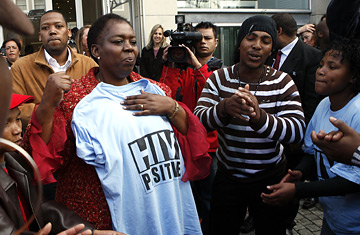
Former South African Health Deputy Minister Nozizwe Madlala-Routledge, who questioned the national AIDS policy.
For a leader often credited with great cunning, South African President Thabo Mbeki has always had something of a blind spot over HIV and AIDS. So it was on Thursday when he fired Deputy Health Minister Nozizwe Madlala-Routledge. Madlala-Routledge worked for Health Minister Manto Tshabalala-Msimang, who extols the virtues of garlic and beets for treating AIDS, and for a president who, despite leading a nation where more than two million have died of the disease, has expressed skepticism that it even exists.
Madlala-Routledge restored some badly needed credibility to Mbeki's government by admitting the government sowed confusion about HIV and AIDS and injected its treatment program with confrontational vigor, describing the number of South Africans waiting for anti-retro-viral drugs a "serious violation of human rights." AIDS activists were outraged at her ejection, and expressed disbelief that Mbeki would fire the minister, a woman, on the eve of Women's Day, a public holiday in South Africa. "This is a dreadful error of judgment that will harm public health care and especially the response to the HIV epidemic," said Nathan Geffen of the Treatment Action Campaign.
Officially, according to an account Madlala-Routledge gave at a press conference on Friday, she was dismissed because she attended an AIDS conference in Spain without Mbeki's permission, and because she made an unsanctioned visit last month to a hospital on South Africa's southern coast to probe reports of high child mortality rates. Another possible reason offered by South African newspapers, based on off-the-record briefings they cited with officials inside Mbeki's administration, was Madlala-Routledge's willingness to question the judgment of her superiors.
Mbeki has long been notorious for his prickliness. And, as the 65-year-old successor to Nelson Mandela enters his final two years as president, his administration seems increasingly intolerant to criticism. His party, the African National Congress (ANC), frequently makes hysterical attacks on foreign press coverage of South Africa. In February, for example, the ANC compared the BBC to "the most die-hard racists in our country" after it aired a documentary about violent crime in the country.
Similarly, South African politics this year has been largely reduced to a petulant squabble between Mbeki and his former deputy president Jacob Zuma, whom Mbeki also sacked in 2005 when one of Zuma's aides was convicted of corruption related to defense contracts. (Zuma denies any involvement.) If Zuma still harbors presidential hopes, one of Mbeki's remaining priorities in office seems to be to block the way of his turncoat former ally. A meaningful fight against AIDS might have been Mbeki's great legacy. Instead, it seems he will likely be remembered for other things.
